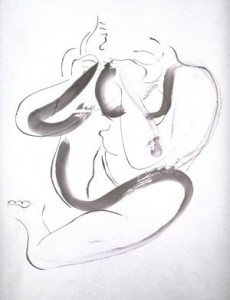Panax Ginseng is a bi-monthly column by Henry W. Leung exploring linguistic and geographic borders in Asian American literature, especially those with hybrid genres, forms, vernaculars, and visions. The column title suggests the English language’s congenital borrowings and derives from the Greek panax, meaning “all-heal,” together with the Cantonese jansam, meaning “man-root.” This perhaps troubling image of one’s roots as panacea informs the column’s readings.
*

*
Every line and stanza in Mei-mei Berssenbrugge’s Hello, the Roses (New Directions, 2013) discharges a single sentence, a mysterious effect.
It’s nothing like the prophetic long line of Whitman’s mad children, no Ginsberg howling on the street corner, saxophonic riffing and swelling, breathless in the moving city as it spills at the seams, flooding forth—
Not quite. Nor is it the disguising work of prose[-block] poetry. Prose poems are camouflaged in continuity, text-wrapped and pressurized without white space. Usually this means, even in narrative prose poems, a sinuous and subterranean movement. This allows an ending to suddenly lift upward out of horizontal motion. (Matthew Olzmann does such sequencing exceptionally well in his lineated poems, using absurd humor for torque.)
But Mei-mei Berssenbrugge’s long line in Hello, the Roses is uniquely specific. Observe, from “The Mouse”:
I can’t recall the beauty of the almond trees.
I’m unable to distinguish between seeing trees, my instant awareness of ethereal beauty and trying to remember images of our having been in Greece.
The moment I think of trees, they diffuse into beings whose frequency so differs from mine, I can’t see them.
They connect with each other in groves that seem celestial, yet our worlds unify.
The dawn of the possibility of their appearance as form, stone, shifts probability toward angels. (12)
Continue reading “Panax Ginseng: The Compassionate Sentence”